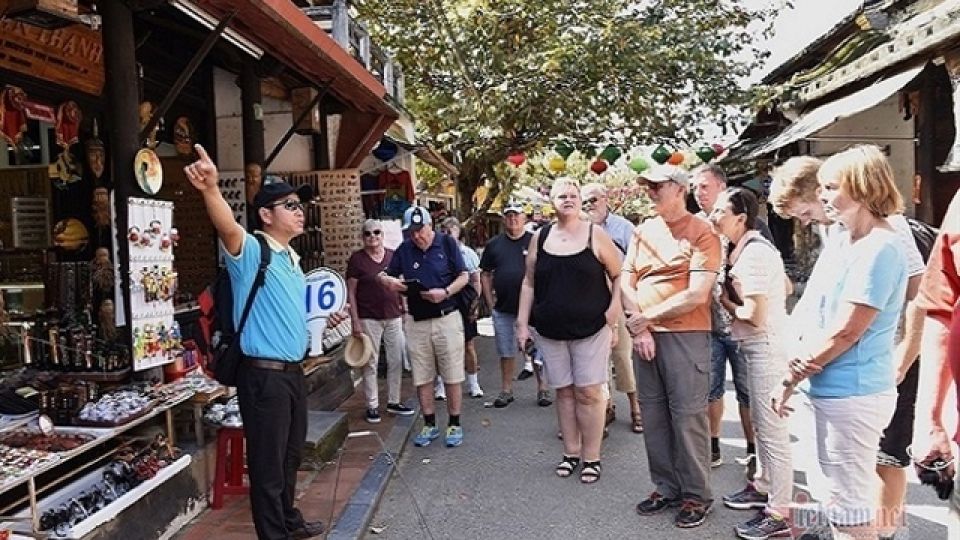March 3, 2022
HANOI — Vietnamese tourism is planned to reopen on March 15, but a labour shortage threatens its recovery.
Nguyễn Vũ Khắc Huy, director of Vina Phu Quoc Travel LTD, underlined the labour supply as the key to tourism recovery.
He said his company had been recruiting experienced employees since late 2021 but to little avail. It seems difficult to find qualified candidates due to the labour shortage.
“For two years of the pandemic, many tourism workers changed jobs. Now, they are either unable or unmotivated to return to the industry,” he explained.
Accordingly, the company has had no choice but to take on fresh graduates to pick up the slack.
Nguyễn Văn Tài, director of Vietsense Travel LTD, revealed that his company was keeping just skeleton crew during the pandemic, and tourism recovery had exposed the need for additional staff.
However, despite its recruitment efforts, the company continues to have its vacancies unfilled due to labour shortages.
“Our current staff are barely enough to meet 50-60 per cent of the demand. We have tried to recruit additional staff but with little success,” he explained.
The director attributed the scarcity of qualified candidates to their unwillingness to return to tourism, saying that his former employees had permanently transitioned to insurance and real estate.
Trương Thị Phương Thảo, head of HR administration at TUI Blue Nam Hội An resort, estimated that her resort needs 250-300 employees to operate at 30-50 per cent capacity, and additional 200-300 employees to exceed half capacity.
She said the resort initially planned to run with 400 employees but ended up with just 150.
The situation is even worse for a tourism company located in Đống Đa District (Hà Nội), which has struggled to add just two employees to the payroll.
With only four staff, the company is understaffed, and the manager has to take charge of almost everything, including product sales and tour management.
The manager put the labour shortage down to pandemic uncertainty, discouraging former tourism workers from returning to the industry.
“About 70-80 per cent of tourism labour have moved to other industries. They are reluctant to return for fear that future outbreaks will render their efforts wasted,” explained the manager.
As labour shortage is a setback for tourism recovery, Nguyễn Quốc Kỳ, chairman of Vietravel Company, urged the Government to provide more financial support.
He suggested zero-interest loans for tourism companies, which could be used to retain good staff, reducing employee turnover.
He also recommended the Government help tourism workers with job finding and training, thereby averting labour disruption.
Regarding unprofitable companies, the chairman called for additional support that does not come in the form of a tax cut but an amount of money commensurate with operating costs.
Additionally, he proposed that the most hard-hit companies should be allowed to report tax-deductible expenses for salaries, wages, commissions and bonuses higher than what they actually paid, thereby benefiting from higher tax deductions.
Nguyễn Trùng Khánh, director of the Vietnam National Administration of Tourism (VNAT), reported 2.5 million tourism workers in the industry before the pandemic.
He said 80-90 per cent of tourism companies had closed down or been running at limited capacity for two years, forcing many workers to jump ship.
Now, the industry had begun to pick up, resulting in mounting labour demand.
“Accordingly, the State needs to introduce policies that invigorate firms and lure back workers,” he stressed.
To that end, VNAT has urged the Ministry of Culture, Sports and Tourism to extend support packages to firms until late 2023.
The support packages include financial support, favourable loans, lower electricity bills, tax cuts and interest reduction.
VNAT also called on local authorities to adopt their own policies to provide local firms and workers with relief and favourable loans and to help them develop new tourism products.
Regarding the lumpsums granted to workers who have lost their jobs since July 2021, the director said 80 per cent of the relief package had been disbursed, and VNAT had advised the Government to step up such a policy.
VNAT had also been offering workers training and retraining programmes to help them return faster.


